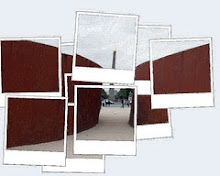Library 2.0 - First off, it has to be at least 3.0, from what little I've learned, lo these past weeks...L 1.0 was an institution that preserved knowledge / culture without sharing, no? So L 2.0 is an institution where you are welcomed to retrieve knowledge / culture, albeit in a 'shushhhhing' mode. So what we're now working to imagine / create is Library 3.0...
So the suggested reading had these in particular that struck me as particularly astute and appropriate:
"No profession can survive if it throws its core principles and values overboard in response to every shift in the zeitgeist. However, it can be equally disastrous when a profession fails to acknowledge and adapt to radical, fundamental change in the marketplace it serves. At this point in time, our profession is far closer to the latter type of disaster than it is to the former. We need to shift direction, and we can’t wait for the big ship of our profession to change course first. It’s going to have to happen one library—one little boat—at a time." - from Away from the Icebergs, Rick Anderson,Director of Resource Acquisition, University of Nevada, Reno Libraries, http://www.oclc.org/nextspace/002/2.htm
"Expanding and enriching metadata will give libraries a competitive advantage and will support the bibliographic services of the future." - from To better bibliographic services, John J. Riemer, Head, UCLA Library Cataloging & Metadata Center, http://www.oclc.org/nextspace/002/5.htm
"Libraries are not merely in communities, they are communities: they preserve and promote community memories; they provide mentors not only for the exploration of stored memory, but also for the creation of new artifacts of memory...Librarians today are not just inventory management biobots: they are people with a unique understanding of the documents they compile and catalog, and the relationships among those documents." - from To a temporary place in time..., Dr. Wendy Schultz, Infinite Futures, http://www.oclc.org/nextspace/002/6.htm
The first sums up the 'call to arms' that the current library community seems to be answering to, and, I believe, wisely so. The second points to an area where libraries can contribute significantly in the Web 2.0+ world. But the last is the one that speaks to thoughts I've been having, though I'd take it one or two or light years steps further: the library community should / could serve to replace that 'trusted' imprimatur traditional publishers wore as the written / spoken word becomes digital and delivery, the other prime traditional publisher service, becomes ubiquitous. This is an idea I'm toying with and can't find adequate expression / justification / realization for as yet but more soon.
That said, and much as I agree with Dr. Schultz, I don't think I'll be meeting her in 4.0, with or without a single malt...
rev a shelf trash
5 years ago





3 comments:
Whit I agree with you and thought that Schultz's piece was most informative. If you read my Blog, and you may disagree, but we may need to step outside of the tax payer budget and allow some of the big players to invest in the country's libraries on a not-for-profit and not-for-recognition basis. Cioa.
Rick Anderson makes some really great points. I think it's a struggle to maintain the library's "core and principles" while adapting to changes, and it's a challenge most of us will face as librarians. We will have to try and find a balance.
It is good to see you guys struggling with these ideas and issues and thinking about it in real time and having discussions about it - you will be the ones to lead the change (or the staying-the-same)!
Post a Comment